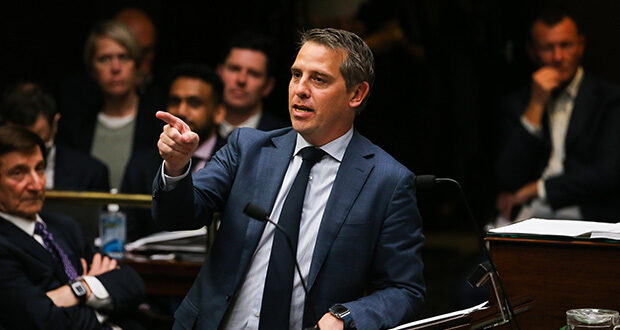The NSW Health Minister is prioritising fairer staffing ratios in hospitals and better working conditions for the state's frontline workers.
Health Minister Ryan Park told Nursing Review he planned to address staffing shortages, high work pressure, and recruitment challenges.
"We need to ensure our healthcare workers are at the heart of our healthcare system," Mr Park said.
"They are the backbone of our healthcare system."
On Monday, NSW Premier Chris Minns announced a 4.5 per cent wage increase for public sector workers, including nurses and paramedics, starting from July 1.
The pay rise, estimated to cost $618 million within a year, will also incorporate a 0.5 per cent boost in superannuation.
The move breaks the wage cap that limited wage growth to 2-3 per cent over the last three years.
"This is the first time that essential workers have had a pay increase at that size for over a decade," Mr Park said.
"The commitment to increasing wages for frontline and essential workers is a start."
The Minns government introduced an industrial relations task force to enforce a 'modern framework', reform the bargaining structure, and ensure stability in the workforce.
It'll replace the previous wage cap system and facilitate a new wage determination process through negotiations between the government and public sector unions.
The government said it hoped to attract and retain healthcare workers who might otherwise move to other states by dismantling the wage cap and offering improved conditions.
It's estimated that over 60 per cent of the nursing workforce is planning to leave the sector in the next five years due to poor working conditions and chronic understaffing.
Earlier this year, the state health department said it lost 12.6 per cent of nursing staff in 2021-22, compared to an average annual loss of 7 per cent over the past three years.
Mr Park said the new task force was recruiting 1,200 additional nurses and midwives to be implemented over the next four years.
"We need to start staffing hospitals differently," Mr Park said.
"Achieving one-to-three staffing levels in emergency departments (ED) is our priority.
"Then, we'll roll that out across the hospital system."
Mr Park said EDs were 'the front door to the hospital' and have been under enormous pressure as Covid-19 cases fluctuated.
Over 1,600 people presented at the ED in January 2022 during the highest peak, followed by a sharp decline to 545 in February 2022.
Presentations then increased to 801 in April 2022 and decreased to 469 in June 2022.
Nurses in the ED faced extreme physical, mental, and emotional challenges due to a lack of staff, protective measures and increased demand.
Most nurses that intended to leave the sector were working in the ED.
Mr Park said reducing pressure on EDs and prioritising regional paramedics would help curb wait times and improve the delivery of quality healthcare.
"We've been exploring virtual and urgent care services to keep people in their homes for treatment and move them away from EDs," he said.
Mr Park said he wanted to boost research in NSW to support the workforce, attract the 'very best' to the state and deliver the highest level of care to community members.
"Embracing world-leading innovations in healthcare is essential," Mr Park said.
"Virtual and urgent care is transforming how we deliver healthcare services."
He said he focused on 'building the human capital, not just the physical spaces.'
Since his inauguration, Mr Park has made 'surprise visits' to private and public hospitals across the state to gauge the workforce's and health system's pressure points.
One night in April, he stunned ED staff from Wollongong Hospital with an unexpected visit.
Westmead Hospital's ED department was also in for an unannounced midnight meeting with Mr Park and the NSW Premier in late March.
"I get a lot out of doing unannounced visits," Mr Park said.
"They're an opportunity for me to see and listen firsthand to what is happening on the ground."
Healthcare workers have told Mr Park they mainly worry about workforce challenges around staffing shortages, high work pressure, and recruitment issues.
In mid-May, Mr Park met with the surgical care task force to enhance surgical services and decrease the waitlist for elective surgeries in the state.
Elective surgery waiting times were heavily influenced by pandemic-related restrictions, leading to a 17 per cent decrease in elective surgeries nationwide compared to the previous year.
By the end of last year, it was estimated that nearly 100,00 people were awaiting elective surgeries, with over 17,000 exceeding the recommended clinical guidelines.
On the helm of the task force are the Director of Surgery for South Western Sydney Local Health District, Professor Neil Merrett, and Deputy Secretary of System Sustainability and Performance for NSW Health, Mr Matthew Daly.
The task force is to report back to the health department sometime in September.
"It's essential to reduce the number of people on our elective surgery waiting list, particularly those waiting outside clinically recommended times," Mr Park said.
Do you have an idea for a story?Email [email protected]
 Nursing Review The latest in heathcare news for nurses
Nursing Review The latest in heathcare news for nurses

